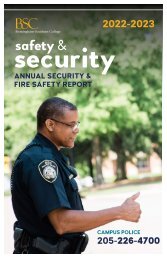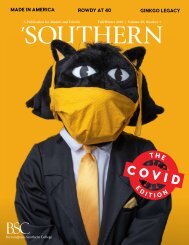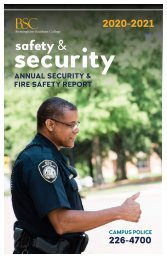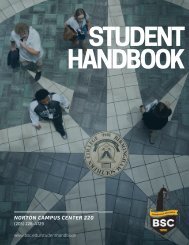Southern Fall/Winter 2022
A Publication for Alumni and Friends
A Publication for Alumni and Friends
Create successful ePaper yourself
Turn your PDF publications into a flip-book with our unique Google optimized e-Paper software.
RESILIENCE<br />
Diagnosed with acute lymphoblastic leukemia during her senior year of high school, Emily<br />
Kyzer Browne ’00 uses what she learned from her experience in her career as a pediatric<br />
oncology nurse practitioner at St. Jude Children’s Research Hospital in Memphis. As a<br />
survivor, she feels called to support the needs of children with similar diagnoses.<br />
“When I applied to Birmingham-<strong>Southern</strong>, an education major was my designated track,” Browne<br />
says. “But then, as my medical treatment progressed, the nurse practitioners who cared for me made<br />
such an impact. My mom asked me, ‘Don’t you want to do something in medicine? You’d be really<br />
good at that. You like science.’”<br />
Browne finished chemotherapy in April 1998, close to the end of her sophomore year. After<br />
graduating from BSC with a biology degree, Browne earned a Master of Science in nursing from<br />
Vanderbilt University in 2002 and a Doctor of Nursing Practice from Vanderbilt in 2013.<br />
In honor of her college advisor and biology professor, the late Dr. Jeannette Runquist, Browne<br />
endowed a scholarship to BSC. She served as Dr.<br />
Runquist’s teaching assistant and as a student mentor<br />
for first-year advisees.<br />
“I never had the confidence to pursue these things<br />
on my own,” says Browne, “but, because of her, I gained<br />
a ton of experience and confidence.”<br />
After completing chemotherapy, Browne was<br />
considered cured, with a low chance of recurrence<br />
after five years. She recognizes her good fortune,<br />
recalling a time in college when she learned that one of<br />
her friends had passed away from the same disease.<br />
“I walked out of my dorm room and looked around<br />
and thought, ‘I don’t know who to talk to about this,<br />
because I don’t feel like anybody around me is going<br />
to necessarily understand.’ Of course, my friends<br />
were supportive. It’s just that it takes a different level<br />
to understand this kind of thing, and how it personally<br />
affected me.”<br />
It was a formative time for Browne — navigating new<br />
college experiences as a cancer patient and survivor.<br />
Browne’s current position as director of the Transition<br />
Oncology Program at St. Jude allows her to support<br />
others navigating a similar transition from patient to<br />
survivor. One common misconception about the end of<br />
treatment is that it’s an exciting and happy time.<br />
“It is for sure — you’ve gone through a lot, and you<br />
survived,” she says. “It’s fantastic to be done with the<br />
weekly visits to the clinic and the chemotherapy and<br />
the side effects from medication, but it is also often a<br />
very scary time. It can be anxiety-provoking, because<br />
you feel like this safety net has been removed. You’re<br />
not checking your labs as often. You’re not on that<br />
medicine that was keeping things at bay, and so in this<br />
phase, with every little sniffle and cough and bruise,<br />
you start to think, oh, no, has it come back?”<br />
She says that, for survivors, everything has changed<br />
since the initial diagnosis.<br />
“The biggest thing that we do for families is provide<br />
anticipatory guidance. Here’s how you might feel;<br />
here’s what you might experience; and really just trying<br />
Thoughts on Courage<br />
Hear Emily Kyzer Browne’s speech<br />
on courage from 100 Minutes on<br />
the Hilltop in 2018.<br />
to normalize that and prepare families for that transition. Otherwise, the patient and their family<br />
might feel like they’re in a black hole where no one really understands what’s going on. Friends and<br />
family might be relieved that it’s all over. They see the patient appearing to be healthier and feel like<br />
there’s nothing to worry about, but the survivor is always worried about disease recurrence, and<br />
about long-term side effects which may not even appear for months to years later.”<br />
The program includes making sure that, as children return to school and regular activities, their<br />
teachers will understand and know how to be supportive.<br />
“It’s a phase of treatment that’s not really been well studied. We know a lot about the actual<br />
treatment itself, and we know a lot about the physical aspects of our long-term survivors of<br />
childhood cancer, but we don’t know a lot about what happens emotionally and socially in those first<br />
few years off therapy. That’s not been studied as well, so we’re hoping to change that.”<br />
FALL/WINTER <strong>2022</strong> / 27






![2023-2024 BSC Catalog Updated_UG ONLY_FINAL[82]](https://img.yumpu.com/68414854/1/178x260/2023-2024-bsc-catalog-updated-ug-only-final82.jpg?quality=85)









